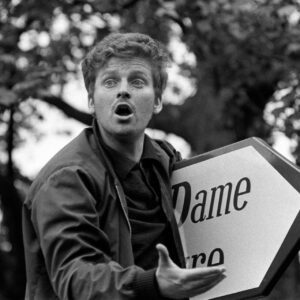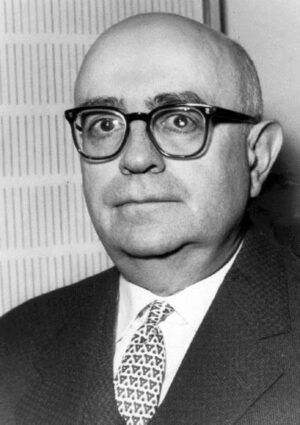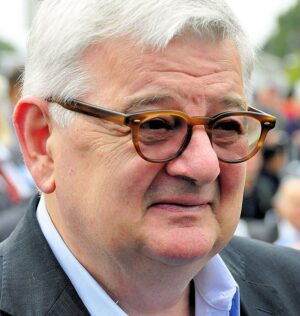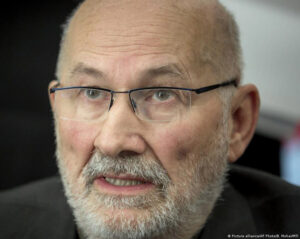Victory of the Lost Revolution
Introduction
In the U.S., the 1968er revolts were mainly connected with the pro-black civil-rights movement as well as protests against the Vietnam War. In Europe, with no involvement in the Vietnam War and no significant sub-Saharan population (yet), protests were mostly limited to students, and were dominated there by left-wing radical and extremist groups. In France, they managed to make the government resign. In Germany, the protests targeted what was perceived as remnants of National-Socialism: the entire parental and grand-parental generations were vilified, and social, political, financial and military structures carried over from the Third Reich were verbally and also physically assaulted. It was a boisterous German resistance movement against Hitler Germany, coming 25 years too late. It was also a movement supported, financed and subverted by communist German and Soviet forces. And then, there was the Jewish element, which is the focus of this article. The Editor.
“[…] the clashes [between de Gaulle and Raymond Aron] in the months leading up to May [19]68 seem all the more explosive in retrospect, as the student uprising is increasingly interpreted as a ‘Jewish revolution’. In 1988, the Jewish magazine Passages brought this aspect to the fore for the first time. A book translated from Hebrew by Yair Auron on ‘Les juifs d’extrème gauche en mai 68’ (Albin Michel) [The Jews of the Extreme Left in May 1968] has now been published to mark the thirtieth anniversary. The Israeli historian writes: ‘It is not easy to prove that the number of Jews involved in the uprising was greater than that of non-Jews. It is easy to prove, however, that they were at the head of the young insurgents. Three of the four charismatic figures were of Jewish origin. The author came across forty, fifty and even more percent of members of Jewish origin in the Trotskyist, Maoist, anarchist and other left-wing extremist groups – between one and two percent of the French are Jewish. Krivine, Cohn-Bendit, Glucksmann, Finkielkraut, Kouchner ‘continue to play a decisive role in political and intellectual debates’. […] Raymond Aron was the first to recognize the long-term changes that were to come from May. All French revolutions of the nineteenth century had ultimately brought about the opposite of their goals and, moreover, had always ‘strengthened the state and exacerbated bureaucratic centralism’. Aron interpreted the events of 1968 in this logic: because the ‘revolution’ had failed, he expected its victory in the medium term. The ‘conservatives’ in power would adopt the revolutionary demands ‘in a moderate form,’ and attempt to remedy the grievances that the uprising had revealed.”[1]

About the book Zappa meets Havel: 1968 and the Consequences by Paul Bermann,[2] Iris Hanika writes:[3]
“He has this to say about the French activists of 1968, who came from Jewish families: ‘They did not feel hatred for people who were different, but love, and willingly acknowledged their otherness. […] And so the young people looked at their elders and felt – contempt. […] They felt morally worthless in the face of what their parents’ generation had been through – or what they had resigned themselves to. […] The young people wanted redemption for their souls’.”
“It is one of the strange contradictions of the internationalists of 1968 that, although they vehemently advocated the right of self-determination for the Vietnamese, the Kurds, the Palestinians, the East Timorese or the Eritreans, they opposed the right of self-determination of their own countrymen as revanchism. They were committed to the refugees and persecuted people all over the world and at the same time condemned the German expellees as reactionaries, if not fascists. […]
Daniel Cohn-Bendit brought the free spirit and cheeky criticism of the ‘old age diseases of communism’ from May in Paris to Germany. As a border crosser between Judaism, France and Germany, he was an early advocate of multiculturalism; he helped pave the way that led to the founding of the Green Party ten years later.”[4]
Sir Ernst H. Gombrich:[5]
“It is one of the tragic ironies of history that the Jews […] were attracted to the left-wing political parties without realizing that the utopia they were enthusiastic about would lead to the opposite of an open society in its realization. This strong participation of Jews in revolutionary movements was, of course, grist to the mill of the anti-Semites.”
Motto at the Berlin Germanists’ Conference in 1968:[6]
“Slay German studies dead, color the blue flower red.”

Theodor Wiesengrund Adorno:[7]
“I am the last person to underestimate the merits of the student movement: it interrupted the smooth transition to a totally administered world. But there is a bit of madness mixed in with it, in which the totalitarian is teleologically inherent, not just as a repercussion – although this is probably also the case.”
Ernst Schumacher (Professor at Humboldt University, Berlin):[8]
“It stinks that we failed, but we have to try to make something out of this stink, something new.”
Bahman Nirumand:[9]
“It was an intoxicating feeling, an absurd self-delusion, a romantic oasis in the midst of the affluent society of West Germany.”
Norbert Bolz knows “the whole secret of 1968”, namely “protest as the royal road to the search for meaning.”9
Ute Erb:9
“I see the real success of our protests […] in Cuba, where I have often come as a vacation emigrant since 1988.”
Reinhard Mohr:[10]
“One of the ironies of history is that the coming to power of the Schröder/Fischer generation will finally historicize the revolt of 1968 and redeem it from the curse of its perpetual claim to validity and even truth.”
“‘Auschwitz’ and ‘guerrilla’ are the elementary stimuli and key words of his generation,” writes Frank Schirrmacher about Joschka Fischer:[11]
“At the party conference [in May 1999], he reminded the radicals of his party of the guerrilla debates of the seventies and early eighties. The guerrilla, Fischer said, quoting an old theorem, must move among the people like a fish in water. Milosevic drains the water so that the guerrilla is left to flounder on dry land. […]
You don’t need to know all the forgotten Tupac Ameru debates from the yellowed ‘course books’ of the student movement to appreciate the grandiose cunning of the Foreign Minister. He not only succeeds in turning NATO into a guerrilla auxiliary force by sending out the barely encrypted signal. He heals the biographical rift that runs through the lives of his audience; suddenly the legend of Che Guevara and the fish-and-water doctrine from the Mao bible rises above the defenders of the war, and May 1999 makes real what May 1968 dreamed of.”
Jürg Altwegg:[12]
“All the sixty-eighters needed was a real war. With Schröder [Germany’s chancelor in 1999] and the red-green coalition, the generation born after those who remembered [the Third Reich] came to power in Germany. The ideological legacy is being disposed of. […] Renegades exchange one world view for another and defend it with even more conviction. […] 1968 was a hysterical outburst, an uprising from the depths of the unconscious – the society that was being fought against was a chimera. […] The fathers were reproached for their [Nazi] past, and the gesture of [retrospect] resistance was adopted. […] This dynamic process makes it possible to understand how people who raved about Fidel Castro and sympathized with Pol Pot called for bombs and ground troops against Milosevic. […] The imaginary fascism that the sixty-eighters fought against has become much more concrete, despite the dubious nature of the analogies. The first war in Europe since 1945 is the last act of coming to terms with the past. […] The Berlin Republic begins with a war and almost French conditions.”
“In the Europe of the left, nothing is as it once was,” reports Michaela Wiegel from a meeting of six European heads of government in the Paris Palace of Sport. “Europe will be socialist, or it won’t be”, moderator Jack Lang proclaimed to the 5,000 or so spectators right at the start. Gerhard Schröder honored the hosts with the statement that Europe owes its principles to France: “Liberty, Equality, Fraternity”. However, freedom also includes freedom of trade, he insisted.[13]
Israel Shahak:[14]
“On the European continent, the attitude towards the great French Revolution is the most important distinguishing mark [shibboleth] – roughly speaking: those who are in favor of it are against anti-Semitism, those who accept it with regret are at least willing to associate with the anti-Semites, and those who hate it and want to eradicate its results belong to the social group from which anti-Semitism arises.”
Hans I. Grünewald:[15]
“In its doctrine of law, Judaism anticipated the French Revolution by three and a half millennia.”
Joseph (Joschka) Fischer:[16]
“All democracies have a basis, a foundation stone. For France, it is 1789; for Germany, it is Auschwitz.”
German historian Gerd Koenen, on the other hand, warns:[17]
“[…] if Auschwitz was the ‘absolute evil,’ then everything else seems relative. However, this is the most absurd use that can be made of this human experience.”

Hans Sedlmayr:[18]
“Basically, aesthetic anarchism is much more dangerous than political anarchism. The revolts of political anarchism have remained ephemeral and have, so far at least, had no impact of historical significance. ‘The anarchists have failed to make their revolution and seem even further from doing so today.’[19] The year 1968, with its uprisings in which the black flag of anarchism was raised, has not changed this, nor have the terrorist attacks of our day. Aesthetic anarchism, however, has spread more and more since the 1920s without being recognized as such, and reached a peak of aggression and destruction in the 1960s. […] The rejection of art, logic, ethics, shame; of the church, the state, the family; of the classical tradition of Europe as well as of every religion – has penetrated the daily and illustrated newspapers, film and television, the theater and events, the practice of life. […] Even the ‘principle of hope’ has nothing effective to offer in opposition to the destruction of so many stops, because what it has to say about the event on which everything is decided, the death of the individual human being, is only a pathetic testimony to the ultimate hopelessness.”
Bertolt Brecht:[20]
“To those born after: I confess it: I / Have no hope. / The blind speak of a way out. I / See. / When the errors are spent / Nothingness sits opposite us as the last companion.”
Bernd Rabehl:[21]
“A people without culture can be tempted to do anything, especially since it is ruled by ‘elites’ who are shaped from ‘outside’ and bear no internal responsibility.”

Horst Mahler:[22]
“We are now experiencing the result of the cultural revolution of 1968 as hell, because our moral substance has evaporated with tradition and religion. We no longer know who we are. […] In the media, especially on television, we portray ourselves as a mindless species. […] As a cultureless people, we are living in a second Stone Age.”
“Just as in the Middle Ages, the victors razed the castles of their defeated opponents, so the victorious Western powers razed national consciousness, the last stronghold of resistance to the rule of global speculative capital. […] Thus we have become a laboratory for the attempt to ‘peacefully’ melt down a great nation.”[23]
And in the East? Vladimir Sorokin (Russian novelist, Moscow):[24]
“In Russia, the 1960s helped the Soviet power to free itself from communist ideology, thereby securing absolute power for it, namely by giving a free hand to the oligarchic nomenclature that rules Russia today. In this way, Orwell’s prophecy, which predicted the regime of oligarchic collectivism in his novel ‘1984,’ was fulfilled.”
Igor Smirnov (Russian literary scholar, teaches in Constance and lives in Munich):24
“The 1960s undoubtedly wanted socialism with a human face, and instead received totalism in a different form. If we compare the situation in Russia today with that which existed before Gorbachev’s reforms, it is basically no different from the totalitarian situation then: both times, a parliament that cannot make serious decisions; a dying head of state; and terror, which may now have lost its state form and turned into the violence of the mafia, but no less remains terror.”
“In his most recent book ‘Russia in the Abyss’, Solzhenitsyn expressed the fear that the hardships of the Second World War may have finally exhausted the strength of his people. A younger author, Vladimir Sorokin, believes that the civil war after the October Revolution had already exhausted social resources.”[25]
At the beginning of the 20th Century, the German-Jewish novelist Kurt Münzer put the following confession into the mouth of his hero:[26]
“It’s not just us Jews who are so degenerate and at the end of an exhausted, used-up culture. All the races of Europe – perhaps we have infected them, we have corrupted their blood. In fact, everything today is Judaized. Our senses are alive in everyone, our spirit rules the world. We are the masters. Because what has power today is the child of our spirit. We may be hated, we may be chased away, our enemies may triumph over our physical weakness. We can no longer be exorcized. We have eaten into the peoples, penetrated the races, defiled them, broken their strength, made everything brittle, rotten and decaying with our stale culture. Our spirit can no longer be eradicated!”
Endnotes
| [1] | Jürg Altwegg, “Der Sieg der verlorenen Revolution”, Frankfurter Allgemeine, 8 June 1998, p. 44. |
| [2] | Zappa meets Havel: 1968 und die Folgen, Rotbuch-Verlag, Hamburg, 1998. |
| [3] | “Kritische Theorie revisited”, Frankfurter Allgemeine, 16 June 1998, p. 10. |
| [4] | Peter Schütt, from 1966 to 1968 member of the Sozialistischer Deutscher Studentenbund (SDS) in Hamburg, Frankfurter Allgemeine, 31 March 1998, p. 9. |
| [5] | Jüdische Identität und jüdisches Schicksal – Eine Diskussionsbemerkung, Passagen, Vienna 1997, p. 63. |
| [6] | Frankfurter Allgemeine, 18 November 1998, p. N 6. |
| [7] | Last letter, dated 6 Aug. 1969 to Marcuse; Deutsches Literaturarchiv, quoted in Frankfurter Allgemeine, 11 July 1998, p. VI. |
| [8] | On the failure of socialism; written in the program booklet of the Berlin heater Volksbühne am Luxemburgplatz on the occasion of a stage production of Brecht’s play “Der gute Mensch von Sezuan”; acc. to Heinrich Lummer, Das rote Quartett, p. 27. |
| [9] | From a book review of Christiane Landgrebe, Jörg Plath, (ed.), ‘68 und die Folgen, Argon, Berlin 1998 in: Frankfurter Allgemeine, 7 December 1998, p. 10. |
| [10] | Der Spiegel No. 42/1998. |
| [11] | Frank Schirrmacher, “Die Lehre des Krieges”, in: Frankfurter Allgemeine, 22 May 1999, p. 41. |
| [12] | “Krieg als Katharsis”, in: Frankfurter Allgemeine, 26 May 1999, p. 51. |
| [13] | Frankfurter Allgemeine, 29 May 1999, p. 5. |
| [14] | Der Juden Götterglaube und Geschichte, Lisbon 1996, p. 159; p. 69 in English original. |
| [15] | Die Lehre Israels, Olzog, Munich/Vienna 1970, p. 263. |
| [16] | Süddeutsche Zeitung, 50/1999. |
| [17] | “Der verstörende Unterschied: Warum Stalinismus und Nazismus doch nicht über einen Kamm zu scheren sind.”, in: Horst Möller (ed.), Der rote Holocaust und die Deutschen, Piper, Munich 1999, p. 97. |
| [18] | Epochen und Werke III, Mäander, Mittenwald 1982, pp. 264f. |
| [19] | James Joll, The Anarchists, 1964, paperback by Methuen & Cie, London 1969, p. 278. |
| [20] | Around 1920, Gedichte 3, p. 189, |
| [21] | Speech given at the Bogenhausener Gespräche; in: Junge Freiheit, 18/25 December 1998, pp. 4f. |
| [22] | “Zweite Steinzeit – Das Erbe der Achtundsechziger”; in: Junge Freiheit, 14 April 1998, p. 2. |
| [23] | “Flugschrift an die Deutschen, die es noch sein wollen, über die Lage ihres Volkes”, Berlin, November 1998, and “Politische Klasse spielt mit dem Feuer: Kann das deutsche Volk den Frieden noch retten?”; in: Ostpreußenblatt, 13/20/27 Feb. 1999, each on p. 7. |
| [24] | Frankfurter Allgemeine, 7 April 1999, p. 53. |
| [25] | Kerstin Holm, Frankfurter Allgemeine, 4 September 1998, p. 41. |
| [26] | Der Weg nach Zion – Ein Roman, Axel Junckers, Stuttgart 1907, p. 291. |
Bibliographic information about this document: Inconvenient History, 2022, Vol. 14, No. 2; first published in German as “Der Sieg der verlorenen Revolution” in: Vierteljahreshefte für freie Geschichtsforschung, Vol. 4, No. 3&4, 2000, pp. 380-382.
Other contributors to this document:
Editor’s comments:
